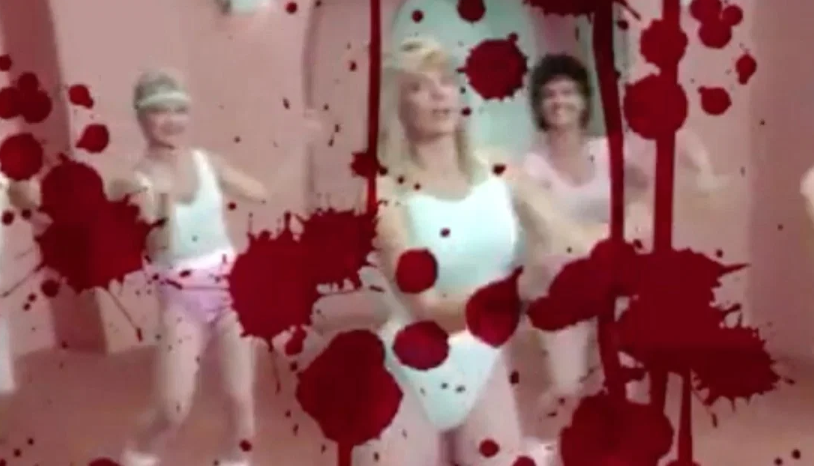Every time you think Ryan Murphy and co-writer/creator Brad Falchuk couldn’t possibly come up with another concept for American Horror Story, lo and behold, we end up all the way at season nine. Maybe one supposes that’s just a testament to how fucking scary the U.S. is, rife for endless material when it comes to drumming up a blood-curdling tale. In this case, it’s a familiar one. Especially if you grew up watching the likes of Halloween and Friday the 13th, which Murphy and Falchuk draw heavily from in their usage of tropes throughout 1984. This much is immediately established in the season’s first episode, “Camp Redwood.” Along with a credits intro that drives home the point that the 80s, as glamorized as they can be, were a sinister time, in large part because it was the first decade when the U.S. was fully brought into the implications of “modern life.” One dominated by First World excess, pop culture overload and a general immunity to having much in the way of heavy emotions.
Setting the stage of the decade in an aerobicizing class in L.A., Murphy and Falchuk go full-tilt Bret Easton Ellis not only in their location, but also in dialogue that finds Montana Duke (Billie Lourd) sizing up newcomer to the class Brooke Thompson (Emma Roberts) as she takes a shower, commenting on her body but saying she’s not a lesbian and then mentions she noticed her checking out her friend Chet’s (Gus Kenworthy) “mound” in the class–does she want to be introduced? As the requisite prude of this horror formula, an embarrassed Brooke insists she was doing no such thing. Still, she encounters Montana with Chet and two other friends, Xavier (Cody Fern, looking as though he was sprung from The Informers) and Ray (DeRon Horton), who discuss their plans to get out of L.A. before the Olympics kicks off (July 28th) and the city becomes overrun with athletes and patriots. Chet is the most embittered about leaving, previously so sure he would be able to participate before being disqualified for the detection of, among other drugs, steroids present in his system. As the shallow quartet discusses their intention to flee for Camp Rosewood (a place that was introduced in an all too Friday the 13th fashion in the first scene), Montana suggests that maybe Brooke ought to join them–after all, there’s a serial killer on the loose called the Night Stalker (a.k.a. Richard Ramirez). To further instill fear in her, Xavier adds that he’s expected to strike with as much vengeance as Son of Sam in the “summer of ‘78” (an allusion the script supervisor fucked up on as that shit went down in the summer of ‘77).
Brooke, however, seems nonplussed, even making the clinical comment that serial killers are known for being more active in the summer, when people tend to keep their windows open. It isn’t until later that night, when she herself is attacked by the Night Stalker that she decides maybe getting out of town is a better idea than sticking around to take her classes to become a veterinarian assistant at Santa Monica College.
With the quartet now a quintet, the car ride up north proves to be tinged with the expected ominous portents, ranging from a gas station attendant named Roy (played by Patrick Swayze’s brother for good 80s measure) telling them straight up, “You’re all gonna die” to running over a hitchhiker (Lou Taylor Pucci) who mutters something about trying his best before passing out. Things don’t let up on creep factor upon arrival, where they are greeted by Margaret Booth (Leslie Grossman), a stodgy woman of god who quickly insists the number one rule of the camp is that no one of the opposite sex sleeps in the same cabins. When Xavier reminds her of the modern times they exist in, she snaps, “I’m aware of the age of decadence we live in,” citing this as just one of the many reasons for her commitment to god and the crusades of Charles Keating against Larry Flynt (a man who himself once said, “The strongest desire we have other than that of survival, is sex. It’s very hard to suppress that appetite”). But her main one, of course, was being the sole survivor of the 1970 massacre that made Camp Redwood illustrious, ultimately causing it to be shut down. With her ear torn off at the hands of Mr. Jingles (a Vietnam vet whose only joy came from killing and wearing the ears of his “conquests” as “trophies” in the form of a necklace), she pretended she was dead like the rest. Not so. And now, she’s here to prove that something positive had to come out of that terrible night of darkness. Of course, we all know this simply isn’t going to be the case.
Visually and cinematographically saturated in the already vibrant 80s-esque style Murphy is known for, AHS: 1984 is right at home in the twenty-first century with its thematic content. For, as all 80s horror movies decreed, the debauched must be punished by the conservative karmic forces that be. In the 1980s, one of the last decades of the twentieth century where killing sprees saw a major spike, that was left to the serial killer (in film and in life). In the 2010s and beyond, it seems to be the government without any mitigating symbol (granted, the Reagan-run government of the 80s was stymying for sex and drugs as well). Though, who knows, maybe the fraught times of now will breed the serial killers of the future, just as the post-WWII era did with the sons of emotionally abusive or non-present fathers. Except, maybe this time around, it will be a generation of women who mobilize their rage in the spirit of Aileen Wuornos.





















